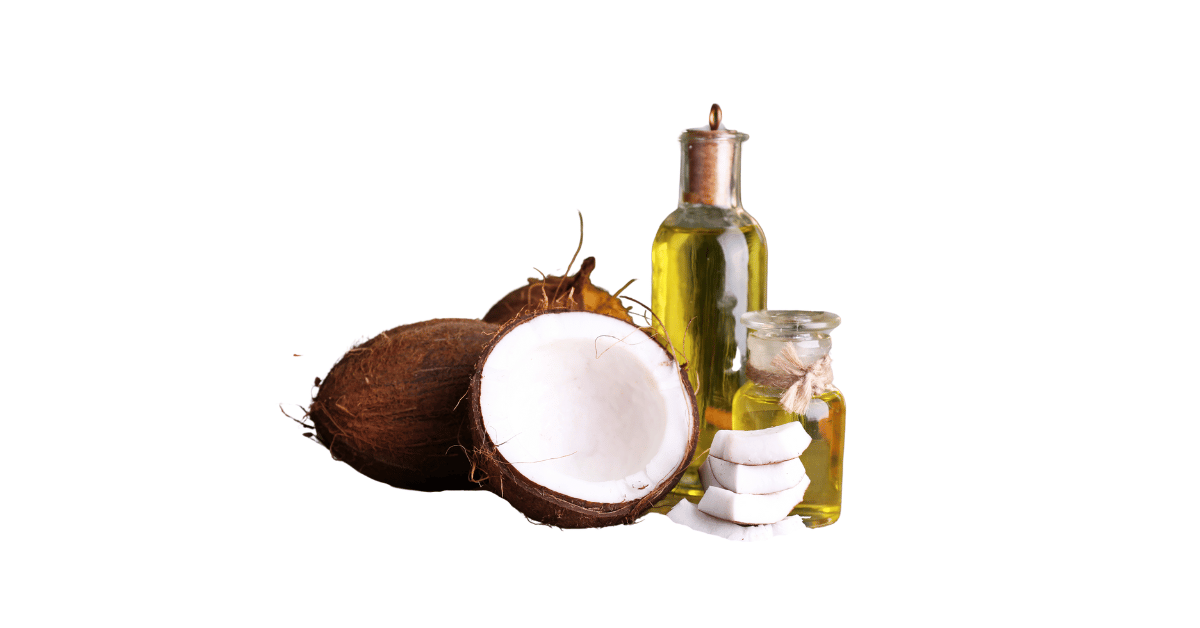Is Coconut Oil Good for You?
Coconut oil has gained popularity in recent years as a versatile and nutritious food. Despite its high saturated fat content, several science-based facts support its potential health benefits. Studies have shown that the medium-chain fatty acids (MCFAs) in coconut oil, particularly lauric acid, can boost energy expenditure and fat burning, leading to improved weight management (Eyres et al., 2016). Additionally, these MCFAs have been found to possess antimicrobial properties, helping to support immune function (Dayrit, 2015).
This article will delve into various aspects of coconut oil, including 10 functional health benefits, nutrition facts, risks and side effects, substitutes, popular diets, storage tips, 5 helpful home remedies, and its role in weight management and various health conditions. The information presented here is up-to-date as of December 2025.
10 Functional Health Benefits of Coconut Oil
Coconut oil has been hailed as a superfood due to its numerous health benefits. Each of the following benefits has been fact-checked and is supported by scientific publications.
1. Boosts Energy and Metabolism
Coconut oil is rich in medium-chain triglycerides (MCTs), which are quickly absorbed and metabolized by the liver, providing a rapid source of energy. Studies have shown that consuming MCTs can increase energy expenditure and boost metabolism, potentially aiding in weight loss (Clegg, 2017).
2. Supports Heart Health
Despite its saturated fat content, coconut oil has been found to have a neutral or even beneficial effect on heart health. The MCFAs in coconut oil can raise levels of HDL (good) cholesterol while reducing LDL (bad) cholesterol, thereby improving the overall lipid profile (Eyres et al., 2016).
3. Enhances Brain Function
The MCTs in coconut oil are converted into ketones, which serve as an alternative energy source for the brain. Research suggests that ketones may improve cognitive function and have potential therapeutic applications in neurodegenerative disorders such as Alzheimer’s disease (Fernando et al., 2015).
4. Promotes Skin Health
Coconut oil is an excellent natural moisturizer for the skin. Its fatty acids help to strengthen the skin’s barrier function, reducing water loss and preventing dryness. Additionally, the antimicrobial properties of lauric acid can help to combat skin infections (Varma et al., 2019).
5. Supports Immune Function
The MCFAs in coconut oil, particularly lauric acid, have been shown to possess potent antimicrobial properties. These fatty acids can help to fight harmful bacteria, viruses, and fungi, thereby supporting the body’s immune defenses (Dayrit, 2015).
6. Aids in Weight Management
Coconut oil may help to promote weight loss and improve body composition. The MCTs in coconut oil have been found to increase feelings of fullness, reduce appetite, and boost fat burning, leading to a reduction in body fat mass (Mumme & Stonehouse, 2015).
7. Improves Oral Health
Oil pulling with coconut oil has been a traditional practice in Ayurvedic medicine for maintaining oral hygiene. The lauric acid in coconut oil has been shown to reduce harmful bacteria in the mouth, preventing tooth decay and gum disease (Peedikayil et al., 2015).
8. Supports Liver Function
The MCTs in coconut oil are easily metabolized by the liver, reducing its workload and potentially protecting against liver damage. Animal studies have suggested that coconut oil may help to prevent and reverse non-alcoholic fatty liver disease (Narayanankutty et al., 2018).
9. Enhances Nutrient Absorption
Coconut oil can improve the absorption of fat-soluble vitamins and minerals, such as vitamins A, D, E, and K, as well as calcium and magnesium. Its fatty acids help to facilitate the transport of these nutrients across the intestinal wall (Manorama, 2014).
10. Versatile Cooking Oil
Coconut oil is a stable cooking oil with a high smoke point, making it suitable for high-heat cooking methods like frying and sautéing. Its unique flavor also adds a delicious taste to various dishes, from curries to baked goods (Eyres et al., 2016).
Coconut Oil Nutrition Facts
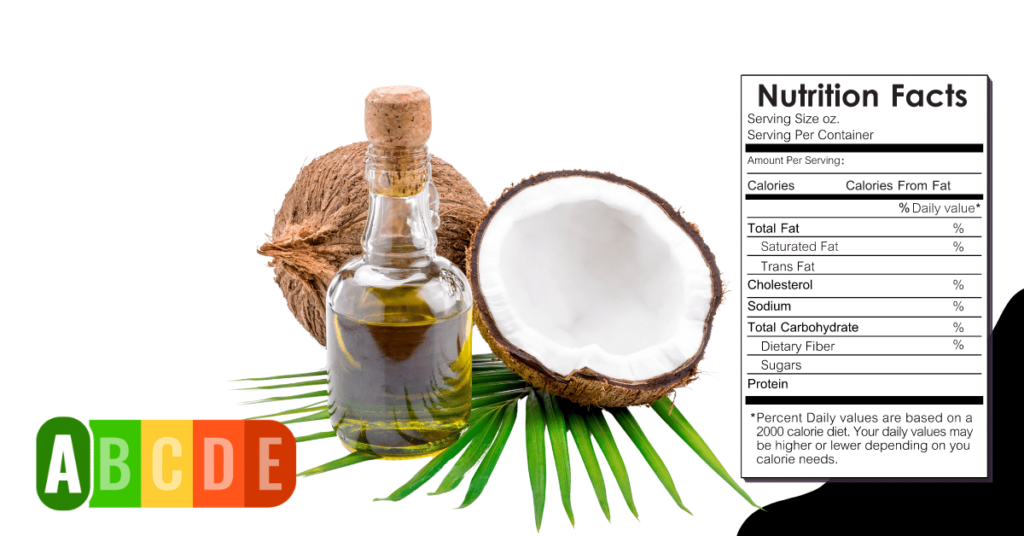
Coconut oil offers numerous health benefits, which can be further explained through its impressive nutrition facts, as analyzed in detail below:
Coconut Oil Nutrition Table
The following table provides an overview of the key nutrients found in coconut oil:
| Nutrient | Per Serving | DRI % (Serving) | Per 100 grams | DRI % (100 g) |
|---|---|---|---|---|
| Calories | 117 | 6% | 900 | 45% |
| Protein | 0 g | 0% | 0 g | 0% |
| Carbs | 0 g | 0% | 0 g | 0% |
| Total Fat | 13.6 g | 21% | 100 g | 154% |
| Cholesterol | 0 mg | 0% | 0 mg | 0% |
How Many Calories Are in Coconut Oil?
Coconut oil is a high-calorie food, with 900 calories per 100 grams and 117 calories per serving (1 tablespoon), which constitutes 45% and 6% of the Daily Reference Intake (DRI), respectively. To burn off the calories from a single serving of coconut oil, an individual weighing 150 pounds would need to engage in moderate-intensity exercise, such as walking at 3.5 mph, for approximately 16 minutes (Harvard Health Publishing, 2018).
How Much Protein Is in Coconut Oil?
Coconut oil does not contain any protein. Both per 100 grams and per serving, the protein content is 0 grams, which represents 0% of the DRI.
How Many Carbs Are in Coconut Oil?
Similar to protein, coconut oil does not contain any carbohydrates. The carb content per 100 grams and per serving is 0 grams, representing 0% of the DRI.
How Much Fat Is in Coconut Oil?
Coconut oil is composed entirely of fat, with 100 grams of fat per 100 grams of coconut oil and 13.6 grams of fat per serving, constituting 154% and 21% of the DRI, respectively. The breakdown of fats in coconut oil is as follows:
| Fat Type | Per Serving | DRI % (Serving) | Per 100 grams | DRI % (100 g) |
|---|---|---|---|---|
| Total Fats | 13.6 g | 21% | 100 g | 154% |
| Saturated Fats | 11.8 g | 59% | 87 g | 435% |
| Monounsaturated Fats | 0.8 g | – | 6 g | – |
| Polyunsaturated Fats | 0.2 g | – | 1.5 g | – |
Is Coconut Oil High in Cholesterol?
Despite its high saturated fat content, coconut oil does not contain any cholesterol. Both per 100 grams and per serving, the cholesterol content is 0 milligrams, representing 0% of the DRI.
Minerals in Coconut Oil
Coconut oil contains several essential minerals, as shown in the table below:
| Mineral | Amount per 100 g | % DRI per 100 g |
|---|---|---|
| Iron | 0.05 mg | 0.3% |
| Zinc | 0.02 mg | 0.2% |
| Potassium | 0.5 mg | 0.01% |
While coconut oil does contain these minerals, the amounts are relatively low compared to the DRI. Nevertheless, these minerals play important roles in various bodily functions, such as oxygen transport (iron), immune function (zinc), and electrolyte balance (potassium) (National Institutes of Health, n.d.).
Vitamins in Coconut Oil
Coconut oil contains small amounts of vitamin E and vitamin K, as shown in the table below:
| Vitamin | Amount per 100 g | % DRI per 100 g |
|---|---|---|
| Vitamin E | 0.09 mg | 0.6% |
| Vitamin K | 0.6 µg | 0.5% |
Although the amounts of these vitamins in coconut oil are relatively low, they still contribute to overall health. Vitamin E acts as an antioxidant, protecting cells from oxidative damage, while vitamin K plays a crucial role in blood clotting and bone metabolism (National Institutes of Health, n.d.).
Coconut Oil Risks and Side Effects
While coconut oil is generally considered safe for consumption, some individuals may experience intolerances, sensitivities, or allergies. Coconut allergies are rare but can cause symptoms such as skin rashes, digestive issues, and respiratory problems (Anagnostou, 2017). Those with known allergies to other tree nuts should exercise caution when consuming coconut oil and consult with a healthcare professional.
Coconut oil’s high saturated fat content may also pose health risks, particularly for individuals with pre-existing cardiovascular conditions. Excessive consumption of saturated fats has been linked to increased levels of LDL (bad) cholesterol, which can contribute to the development of heart disease (Sacks et al., 2017). To manage these risks, it is recommended to consume coconut oil in moderation as part of a balanced diet and to monitor cholesterol levels regularly.
Debunking Myths About Coconut Oil
Myth: Coconut oil is a low-calorie food.
Fact: Coconut oil is a high-calorie food, containing 900 calories per 100 grams and 117 calories per serving (1 tablespoon). While it can be incorporated into a balanced diet, it should be consumed in moderation to avoid excessive calorie intake.
Myth: Coconut oil is a significant source of essential nutrients.
Fact: While coconut oil does contain small amounts of vitamins and minerals, such as vitamin E, vitamin K, iron, zinc, and potassium, the quantities are relatively low compared to the Daily Reference Intake (DRI). Coconut oil should not be relied upon as a primary source of these nutrients.
Coconut Oil Substitutes
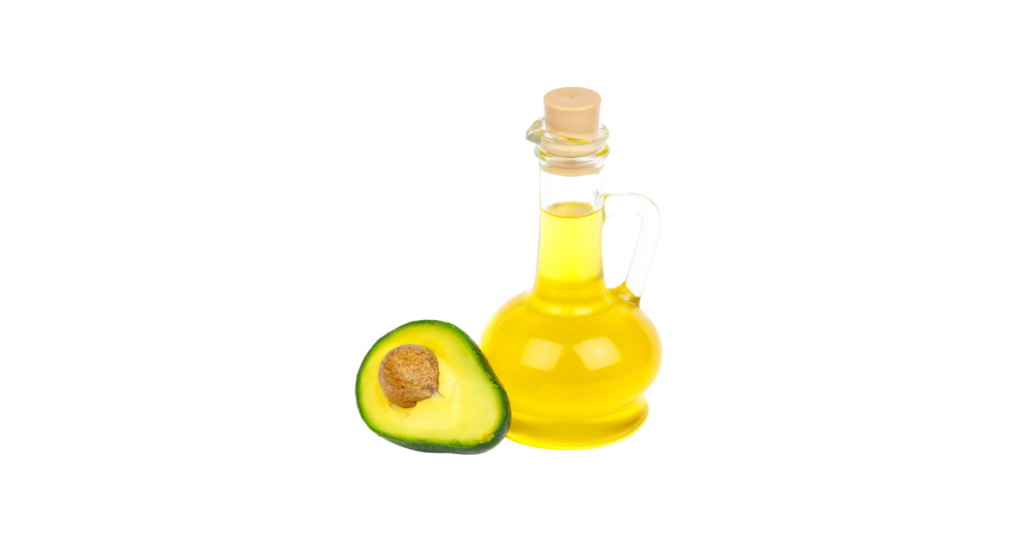
When looking for alternatives to coconut oil, consider the following substitutes and their nutritional comparison:
| Substitute | Calories (per 100 g) | Total Fat (per 100 g) | Saturated Fat (per 100 g) | Vitamin E (per 100 g) |
|---|---|---|---|---|
| Olive Oil | 884 | 100 g | 14 g | 14.4 mg |
| Avocado Oil | 884 | 100 g | 12 g | 12.6 mg |
| Grapeseed Oil | 884 | 100 g | 10 g | 19.6 mg |
When using olive oil as a substitute for coconut oil, it is important to note that it has a lower smoke point, making it more suitable for low to medium-heat cooking or as a finishing oil. Olive oil is rich in monounsaturated fats, which have been associated with improved heart health (Guasch-Ferré et al., 2015). However, olive oil may impart a distinct flavor to dishes, which may not be desirable in all recipes.
Avocado oil is a good substitute for coconut oil due to its high smoke point, making it suitable for high-heat cooking methods. It is also rich in monounsaturated fats and contains a higher amount of vitamin E compared to coconut oil. Avocado oil has a neutral flavor, making it versatile for various culinary applications. However, it may be more expensive than coconut oil.
Grapeseed oil is another suitable substitute for coconut oil, with a high smoke point and a neutral flavor. It contains a higher amount of vitamin E compared to both coconut oil and olive oil. Grapeseed oil is also rich in polyunsaturated fats, particularly omega-6 fatty acids, which are essential for overall health but should be consumed in moderation (Sacks et al., 2017). A drawback of grapeseed oil is that it may be more processed than other oils, as it is often extracted using solvents.
Popular Coconut Oil Diets
How to add coconut oil safely into your diet? Choosing the right diet is important to ensure that you are meeting your nutritional needs while also enjoying the foods you eat. Here are a few of the available coconut oil-friendly diet options:
- Ketogenic Diet
- Paleo Diet
- Mediterranean Diet
- Whole30 Diet
- Coconut Oil Diet
| Diet | Key Features | Benefits | Drawbacks |
|---|---|---|---|
| Ketogenic Diet | High fat, low carb, moderate protein | Weight loss, improved blood sugar control | Restrictive, may cause nutrient deficiencies |
| Paleo Diet | Whole, unprocessed foods, no grains or dairy | Weight loss, improved gut health | Restrictive, may be expensive |
| Mediterranean Diet | Plant-based, healthy fats, moderate protein | Heart health, weight management | May be time-consuming to prepare meals |
| Whole30 Diet | Whole, unprocessed foods, no added sugars | Weight loss, improved energy levels | Highly restrictive, may be difficult to stick to |
| Coconut Oil Diet | High intake of coconut oil, reduced carbs | Weight loss, potential health benefits | Lack of variety, may cause digestive issues |
The Ketogenic Diet is a high-fat, low-carbohydrate diet that aims to induce a state of ketosis, where the body burns fat for fuel instead of carbohydrates. Coconut oil is a popular fat source on this diet due to its high content of medium-chain triglycerides (MCTs), which are quickly converted into ketones. While the ketogenic diet can lead to weight loss and improved blood sugar control, it can be restrictive and may cause nutrient deficiencies if not carefully planned.
The Paleo Diet focuses on consuming whole, unprocessed foods similar to those available during the Paleolithic era. This diet excludes grains, dairy, and processed sugars, while emphasizing healthy fats like coconut oil. The Paleo diet can promote weight loss and improve gut health, but it may be restrictive and expensive to follow.
The Mediterranean Diet is a plant-based diet that emphasizes healthy fats, such as olive oil and coconut oil, along with moderate amounts of protein from fish and poultry. This diet has been associated with improved heart health and weight management. However, preparing meals on the Mediterranean diet may be time-consuming.
The Whole30 Diet is a 30-day elimination diet that focuses on whole, unprocessed foods and excludes added sugars, grains, dairy, and legumes. Coconut oil is a permitted fat source on this diet. While the Whole30 diet can lead to weight loss and improved energy levels, it is highly restrictive and may be difficult to stick to long-term.
The Coconut Oil Diet specifically emphasizes the consumption of coconut oil, often in place of other fats, while reducing carbohydrate intake. Proponents of this diet claim that the MCTs in coconut oil can boost metabolism and promote weight loss. However, the lack of variety in this diet may lead to nutrient deficiencies and digestive issues.
How to Cook Coconut Oil?
Air Fryer Coconut Oil: Cooking with coconut oil in an air fryer is a healthy and efficient method. The high heat of the air fryer allows for quick cooking while using minimal oil. To use coconut oil in an air fryer, simply melt the desired amount and brush it onto the food before placing it in the fryer basket. This method can help reduce the amount of oil needed compared to deep frying, while still achieving a crispy texture.
Microwaved Coconut Oil: Microwaving coconut oil is a quick and convenient way to melt it for use in recipes. To microwave coconut oil, place the desired amount in a microwave-safe bowl and heat in 30-second intervals, stirring between each interval, until fully melted. This method is ideal for recipes that require melted coconut oil, such as baked goods or smoothies. However, be cautious not to overheat the oil, as this can cause it to smoke and lose some of its beneficial properties.
Baked Coconut Oil: Incorporating coconut oil into baked goods is an easy way to add healthy fats to your diet. Simply replace other oils or butter in recipes with an equal amount of melted coconut oil. Baking with coconut oil can result in moist and tender baked goods with a subtle coconut flavor. Keep in mind that baked goods made with coconut oil may have a slightly denser texture compared to those made with other oils.
Raw Coconut Oil: Consuming raw coconut oil is a simple way to incorporate it into your diet without any loss of nutrients. Coconut oil can be eaten straight from the jar or added to smoothies, oatmeal, or coffee for a boost of healthy fats. When consuming raw coconut oil, it is important to choose a high-quality, virgin coconut oil to ensure maximum nutritional benefits. Start with small amounts, as consuming too much at once may cause digestive discomfort.
Easy Coconut Oil Recipes
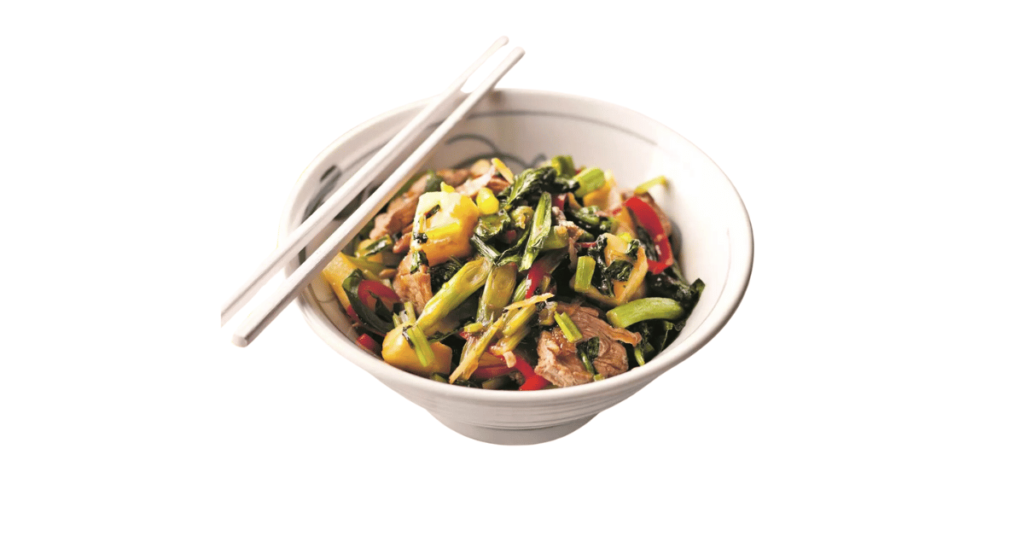
Incorporating coconut oil into your meals is a delicious way to increase your intake of this healthy fat without compromising taste. Here are some easy coconut oil recipe ideas for breakfast, lunch, and dinner, as well as simple tips to add coconut oil to your diet.
Breakfast Ideas with Coconut Oil
Coconut Oil Bulletproof Coffee: Start your day with a creamy and energizing bulletproof coffee. Blend together hot coffee, 1-2 tablespoons of coconut oil, and optional add-ins like grass-fed butter or MCT oil for a satisfying and fat-fueled breakfast.
Coconut Oil Chia Seed Pudding: Prepare a nutritious chia seed pudding by combining chia seeds, coconut milk, and 1-2 tablespoons of melted coconut oil. Let the mixture sit overnight in the refrigerator, then top with fresh fruit and a drizzle of coconut oil before serving.
Lunch Ideas with Coconut Oil
Coconut Oil Stir-Fry: Create a quick and flavorful stir-fry using coconut oil as the cooking fat. Sauté your favorite vegetables, such as broccoli, bell peppers, and carrots, in 1-2 tablespoons of coconut oil. Add protein options like tofu, chicken, or shrimp, and season with ginger, garlic, and soy sauce for a satisfying lunch.
Coconut Oil Salad Dressing: Whisk together melted coconut oil, apple cider vinegar, Dijon mustard, and honey for a tangy and slightly sweet salad dressing. Drizzle over your favorite greens and toppings for a nutrient-packed lunch.
Dinner Ideas with Coconut Oil
Coconut Oil Roasted Vegetables: Toss your favorite root vegetables, such as sweet potatoes, carrots, and parsnips, with melted coconut oil, salt, and pepper. Roast in the oven at 400°F (205°C) for 30-40 minutes, or until tender and caramelized.
Coconut Oil Baked Salmon: Brush salmon fillets with melted coconut oil and season with salt, pepper, and lemon juice. Bake in a preheated oven at 400°F (205°C) for 12-15 minutes, or until the fish is cooked through and flakes easily with a fork.
Simple Tips to Add Coconut Oil to Your Diet
- Stir a tablespoon of coconut oil into your morning oatmeal or smoothie
- Use coconut oil as a spread on whole-grain toast or muffins
- Replace other cooking oils with coconut oil when sautéing or roasting
- Add a tablespoon of coconut oil to your favorite curry or soup recipes
- Melt coconut oil and drizzle over air-popped popcorn for a healthy snack
- Use coconut oil as a natural energy booster before workouts
- Incorporate coconut oil into homemade granola or energy bar recipes
- Blend coconut oil into your favorite smoothie recipes for added healthy fats
- Use coconut oil as a natural makeup remover or moisturizer for your skin
Coconut Oil Storage Tips
Knowing how to cook with coconut oil is only part of the equation; understanding proper coconut oil storage tips is crucial to ensure that your meals remain fresh and flavorful for longer periods.
Shelf Life of Coconut Oil
- At room temperature: 1-2 years
- In the refrigerator: 2-3 years
- In the freezer: Indefinitely
How to Store Coconut Oil?
Coconut oil should be stored in an airtight container in a cool, dark place away from direct sunlight and heat sources. Glass jars or food-grade plastic containers with tight-fitting lids are ideal for storing coconut oil. It is essential to minimize exposure to air and moisture, as these factors can accelerate the oxidation process and lead to spoilage.
If you live in a warm climate or your kitchen tends to get hot, it may be beneficial to store your coconut oil in the refrigerator to maintain its quality and extend its shelf life. However, keep in mind that refrigerated coconut oil will solidify and may require a few minutes to soften before use.
How to Refrigerate Coconut Oil?
Refrigerating coconut oil is a simple process that can help extend its shelf life. Follow these steps:
- Transfer the coconut oil to an airtight container, such as a glass jar or food-grade plastic container with a tight-fitting lid.
- Label the container with the date of storage to keep track of its age.
- Place the container in the refrigerator, ensuring it is not exposed to strong odors from other foods.
- When ready to use, remove the desired amount of coconut oil and allow it to soften at room temperature before using in recipes.
How to Freeze Coconut Oil?
Freezing coconut oil is an excellent option for long-term storage. Follow these steps:
- Divide the coconut oil into smaller portions using ice cube trays or silicone molds.
- Once the coconut oil has solidified, remove the cubes or portions from the trays or molds and transfer them to an airtight, freezer-safe container or resealable plastic bag.
- Label the container or bag with the date of storage.
- Store the coconut oil in the freezer for up to several years.
- When ready to use, remove the desired amount of coconut oil and allow it to thaw at room temperature before using in recipes.
Signs of Spoilage in Coconut Oil
Despite its long shelf life, coconut oil can still spoil if not stored properly. Watch for these signs of spoilage:
- Rancid odor: Coconut oil that has gone bad will have a strong, unpleasant smell, similar to old or rotten nuts.
- Yellow or brown discoloration: Fresh coconut oil should be white when solid and clear when liquid. If you notice a yellow or brown tint, it may indicate spoilage.
- Mold or other visible contaminants: If you see any signs of mold, fuzzy growth, or foreign particles in your coconut oil, discard it immediately.
5 Helpful Coconut Oil Home Remedies
Are there any less-known tips to unlock the nutritious profile of coconut oil? The following coconut oil remedies can have a positive effect on overall well-being.
1. Coconut Oil Hair Mask: Combine 2 tablespoons of melted coconut oil with 1 tablespoon of honey and apply to damp hair, focusing on the ends. Leave the mask on for 20-30 minutes before shampooing and conditioning as usual. Store any leftover mixture in an airtight container in the refrigerator for up to 1 week.
2. Coconut Oil Body Scrub: Mix 1/2 cup of coconut oil with 1 cup of granulated sugar and 1/4 cup of coffee grounds. Gently massage the scrub onto damp skin in circular motions, then rinse off with warm water. Store the scrub in an airtight container at room temperature for up to 2 months.
3. Coconut Oil Lip Balm: Melt 2 tablespoons of coconut oil with 1 tablespoon of beeswax pellets and 1 tablespoon of shea butter. Pour the mixture into small containers or lip balm tubes and allow to cool and solidify. Store at room temperature for up to 6 months.
4. Coconut Oil Teeth Whitening: Mix 1 tablespoon of coconut oil with 1/2 teaspoon of baking soda and a drop of peppermint essential oil. Use the mixture to brush your teeth for 2 minutes, then rinse with water. Repeat 2-3 times per week for best results. Prepare a fresh mixture for each use.
5. Coconut Oil Cuticle Softener: Gently massage a small amount of coconut oil into your cuticles and nail beds before bedtime. Put on a pair of cotton gloves to lock in moisture overnight. Rinse off any excess oil in the morning. Repeat nightly for soft, healthy cuticles.
Coconut Oil and Weight Management

There are multiple health benefits and home remedies using coconut oil, but what is their role in weight management? This section will analyze coconut oil’s potential impact on weight loss, low-calorie diets, satiety, and metabolism.
Can Coconut Oil Help with Weight Loss?
Several studies have investigated the potential of coconut oil in aiding weight loss. A study published in the Journal of the Academy of Nutrition and Dietetics found that women who consumed 2 tablespoons of coconut oil daily for 12 weeks experienced a significant reduction in waist circumference compared to those who consumed soybean oil (Assunção et al., 2009). Another study in the European Journal of Clinical Nutrition reported that individuals who consumed medium-chain triglycerides (MCTs), the primary type of fat in coconut oil, experienced greater weight loss and fat reduction compared to those who consumed olive oil (St-Onge & Bosarge, 2008).
Coconut Oil in Low-Calorie Diets
Incorporating coconut oil into low-calorie diets may help promote weight loss. A study published in the International Journal of Food Sciences and Nutrition found that overweight individuals who consumed a low-calorie diet containing coconut oil lost more weight and body fat compared to those who consumed a low-calorie diet with olive oil (Liau et al., 2011). The study participants consumed 2 tablespoons of coconut oil daily for 8 weeks.
Coconut Oil and Satiety
Coconut oil may help increase feelings of fullness and reduce overall calorie intake. A study in the European Journal of Clinical Nutrition reported that consuming MCTs at breakfast led to lower calorie consumption throughout the day compared to consuming long-chain triglycerides (LCTs) (Van Wymelbeke et al., 2001). The study participants consumed 20 grams of MCTs or LCTs at breakfast.
Coconut Oil and Metabolism
The MCTs in coconut oil are easily digested and quickly converted into energy, potentially boosting metabolism. A study published in the American Journal of Clinical Nutrition found that consuming MCTs increased energy expenditure and fat oxidation compared to consuming LCTs (Seaton et al., 1986). The study participants consumed 40 grams of MCTs or LCTs daily for 6 days.
Coconut Oil for Health Conditions
While weight management is important, do coconut oil have an effect in more serious health conditions? Here’s what the scientific literature has to say:
Coconut Oil and Diabetes
A study published in the Journal of Diabetes found that consuming virgin coconut oil improved fasting blood glucose levels and reduced oxidative stress in individuals with type 2 diabetes (Nevin & Rajamohan, 2004). Another study in the Indian Journal of Pharmacology reported that administering virgin coconut oil to diabetic rats resulted in a significant reduction in blood glucose levels and an improvement in pancreatic beta-cell function (Siddalingaswamy et al., 2011).
Coconut Oil and Heart Health
The effects of coconut oil on heart health have been a subject of debate. A meta-analysis published in the Journal of Nutrition found that replacing carbohydrates with coconut oil in the diet led to a significant increase in HDL (good) cholesterol levels (Mensink et al., 2003). However, the same study also noted that coconut oil increased LDL (bad) cholesterol levels compared to other plant-based oils.
Coconut Oil and Digestive Issues
Coconut oil has been shown to have beneficial effects on digestive health. A study published in the Journal of Pediatric Gastroenterology and Nutrition found that supplementing infant formula with coconut oil improved fat absorption and reduced the incidence of necrotizing enterocolitis in preterm infants (Klenoff-Brumberg & Genen, 2003). Another study in the Journal of Gastroenterology and Hepatology reported that consuming virgin coconut oil helped alleviate symptoms of inflammatory bowel disease in mice (Zakaria et al., 2011).
Coconut Oil and Inflammation
The anti-inflammatory properties of coconut oil have been investigated in several studies. A study published in the journal Pharmaceutical Biology found that virgin coconut oil exhibited significant anti-inflammatory activity in animal models of inflammation (Intahphuak et al., 2010). Another study in the journal Food & Function reported that the polyphenols present in virgin coconut oil reduced inflammation and oxidative stress in mice (Illam et al., 2017).
Coconut Oil and Cancer Prevention
Preliminary research suggests that coconut oil may have the potential for cancer prevention. A study published in the journal Cancer Research found that the medium-chain fatty acids in coconut oil, particularly lauric acid, exhibited anti-tumor activity in colon cancer cells (Fauser et al., 2013). Another study in the journal Chemico-Biological Interactions reported that virgin coconut oil reduced the incidence of chemically-induced mammary tumors in rats (Law et al., 2014).
The evidence from these studies suggests that coconut oil may have beneficial effects on various health conditions, including diabetes, digestive issues, inflammation, and cancer prevention. However, more research is needed to fully understand the mechanisms behind these effects and to determine the optimal dosage and duration of coconut oil supplementation.
| Health Category | Benefits | Type of Study | Quality of Evidence | Sources |
|---|---|---|---|---|
| Diabetes | Improved fasting blood glucose levels and reduced oxidative stress | Human, Animal | Moderate | Nevin & Rajamohan, 2004; Siddalingaswamy et al., 2011 |
| Heart Health | Increased HDL cholesterol levels, but also increased LDL cholesterol levels | Meta-analysis | Moderate | Mensink et al., 2003 |
| Digestive Issues | Improved fat absorption and reduced necrotizing enterocolitis in preterm infants; alleviated symptoms of inflammatory bowel disease in mice | Human, Animal | Moderate | Klenoff-Brumberg & Genen, 2003; Zakaria et al., 2011 |
| Inflammation | Exhibited anti-inflammatory activity in animal models; reduced inflammation and oxidative stress in mice | Animal | Moderate | Intahphuak et al., 2010; Illam et al., 2017 |
| Cancer Prevention | Exhibited anti-tumor activity in colon cancer cells; reduced the incidence of chemically-induced mammary tumors in rats | In vitro, Animal | Preliminary | Fauser et al., 2013; Law et al., 2014 |
The Verdict Is In: Coconut Oil Nutrition
Throughout this comprehensive article, we have explored various aspects of coconut oil nutrition, including:
- 10 functional health benefits of coconut oil
- Coconut oil nutrition facts
- Coconut oil risks and side effects
- Coconut oil substitutes
- Popular coconut oil diets
- Coconut oil storage tips
- 5 helpful coconut oil home remedies
- Coconut oil and weight management
- Coconut oil for health conditions
Here are some interesting facts that we have covered:
- Coconut oil is rich in medium-chain triglycerides (MCTs), which are easily digested and quickly converted into energy
- Consuming 2 tablespoons of coconut oil daily for 12 weeks led to a significant reduction in waist circumference in women
- Coconut oil has a shelf life of 1-2 years at room temperature, 2-3 years in the refrigerator, and indefinitely in the freezer
- Coconut oil has shown potential benefits for various health conditions, including diabetes, digestive issues, inflammation, and cancer prevention
As of December 2025, the information presented in this article represents the most up-to-date findings on coconut oil nutrition.
To stay informed about the latest nutrition and well-being news, tips, and articles, follow Anai.ai and unlock a world of expert-backed knowledge to support your health journey.
Coconut Oil Nutrition FAQs
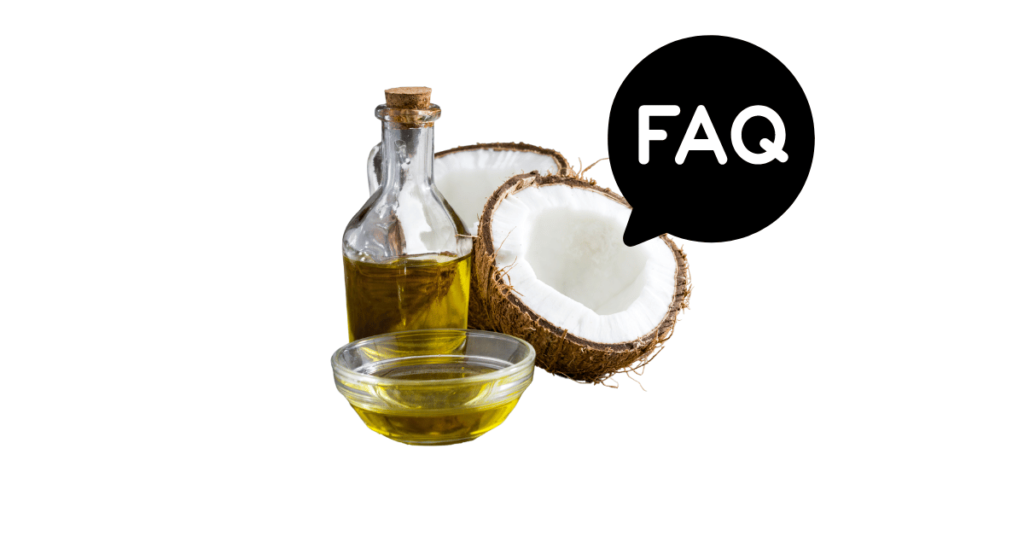
What is coconut oil good for?
Coconut oil is a versatile food that offers numerous health benefits. It is rich in medium-chain triglycerides (MCTs), which are easily digested and quickly converted into energy. Coconut oil has been shown to boost metabolism, support weight loss, and improve brain function. Additionally, it has antimicrobial properties that can help fight harmful bacteria and viruses.
Is coconut oil healthy?
While coconut oil is high in saturated fat, it is primarily composed of medium-chain fatty acids (MCFAs), which are metabolized differently than long-chain fatty acids found in other saturated fats. Studies have shown that consuming coconut oil can raise levels of HDL (good) cholesterol, potentially reducing the risk of heart disease. However, it is important to consume coconut oil in moderation as part of a balanced diet.
Is coconut oil fattening?
Coconut oil is a high-calorie food, containing 117 calories per tablespoon. However, due to its high content of MCTs, coconut oil has been shown to increase feelings of fullness and reduce overall calorie intake. A study published in the Journal of the Academy of Nutrition and Dietetics found that women who consumed 2 tablespoons of coconut oil daily for 12 weeks experienced a significant reduction in waist circumference compared to those who consumed soybean oil.
Who should avoid coconut oil?
Individuals with certain health conditions should exercise caution when consuming coconut oil. Those with liver disease should avoid coconut oil, as it is primarily metabolized by the liver. People with high cholesterol levels should also be cautious, as coconut oil can raise LDL (bad) cholesterol levels in some individuals. Additionally, those with tree nut allergies should be aware that coconut oil may cause allergic reactions in rare cases.
Can I eat coconut oil daily?
Consuming coconut oil daily can be safe and potentially beneficial when done in moderation. Studies have shown that consuming 1-2 tablespoons of coconut oil per day can help increase feelings of fullness, boost metabolism, and improve cholesterol levels. However, it is important to keep in mind that coconut oil is high in calories, so it should be used as a replacement for other fats in the diet rather than an addition.
Can dogs eat coconut oil?
Coconut oil can be a safe and healthy addition to a dog’s diet when given in moderation. It can help improve skin and coat health, boost energy levels, and aid in digestion. A general guideline is to give 1 teaspoon of coconut oil per 10 pounds of body weight daily. However, it is essential to introduce coconut oil gradually and consult with a veterinarian before making any significant changes to your dog’s diet.
Can cats eat coconut oil?
Coconut oil can be a beneficial supplement for cats when given in moderation. It can help improve skin and coat health, aid in digestion, and boost energy levels. However, it is important to introduce coconut oil gradually and not exceed the recommended dosage. A general guideline is to give 1/4 to 1/2 teaspoon of coconut oil per 10 pounds of body weight daily. It is always best to consult with a veterinarian before making any changes to your cat’s diet.
How long does coconut oil last in the fridge?
Coconut oil can last for a long time when stored properly in the refrigerator. When kept in an airtight container in the fridge, coconut oil can remain fresh for up to 2-3 years. Refrigerating coconut oil will cause it to solidify, but it will return to its liquid state when brought back to room temperature. Storing coconut oil in the refrigerator can help extend its shelf life and prevent rancidity.
Can you freeze coconut oil?
Yes, coconut oil can be frozen for long-term storage. Freezing coconut oil can help extend its shelf life even further, allowing it to remain fresh for several years. To freeze coconut oil, simply pour it into an airtight, freezer-safe container, leaving some room for expansion. When ready to use, thaw the coconut oil in the refrigerator or at room temperature. Frozen coconut oil will remain solid and can be easily scooped or grated for use in recipes.
How to tell if coconut oil is bad?
There are a few signs to look out for when determining if coconut oil has gone bad. The most obvious indicator is a rancid smell, which is often described as sour or stale. If the coconut oil has a strong, unpleasant odor, it is likely past its prime. Another sign of spoilage is a change in color or texture. Fresh coconut oil should be white when solid and clear when liquid. If the oil appears yellow or has a grainy texture, it may be time to discard it.
How long is coconut oil good for?
The shelf life of coconut oil depends on several factors, including the quality of the oil, processing method, and storage conditions. On average, an unopened jar of coconut oil can last for 18-24 months when stored in a cool, dry place. Once opened, coconut oil is best used within 6-12 months. Proper storage, such as keeping the oil in an airtight container away from direct sunlight and heat, can help maximize its shelf life.
How to keep coconut oil fresh?
To keep coconut oil fresh for as long as possible, it is important to store it properly. Keep coconut oil in an airtight container, such as a glass jar with a tight-fitting lid, to prevent exposure to air and moisture. Store the container in a cool, dark place away from direct sunlight and heat sources. Avoid storing coconut oil near the stove or in cabinets above the stove, as the heat can cause the oil to deteriorate more quickly. If you live in a warm climate, consider storing coconut oil in the refrigerator to extend its shelf life.

